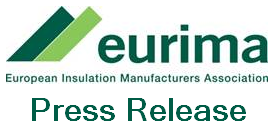
European Commission takes Sustainable Construction to the next LEVEL(S)!
Date
Sections
Brussels, 20 September 2017
Eurima welcomes the EU voluntary reporting framework “Level(s)” to improve the sustainability of buildings. It provides a common EU approach to the assessment of environmental performance of residential and office buildings. The EC, with the support of a large group of stakeholders, defined over the last 2 years its vision for Sustainable Buildings with the selection of 6 macro-objectives to which the built environment can contribute. The balanced approach with environmental, social and economic indicators, as well as the option of working with building assessment at three different levels, common comparative or optimization assessment, which makes the framework a tool that can help the construction sector to transition towards a more sustainable building stock.
The uptake of life cycle assessment (LCA) as the key methodology for the evaluation of the environmental impacts reflects the evolutions of existing building rating schemes and most recent environmental legislation for buildings (e.g. France, the Netherlands and Finland). A Eurima White Paper on the role of life cycle assessment at the building level has been just released and is available on the Eurima website.
Energy performance during the use phase, in line with the principles of the EPBD, remains for new and renovated buildings a key priority. The emphasis through the macro-objectives on healthy and comfortable spaces, adaptation to climate change and life cycle cost cover social and economic impacts which will allow added value for many stakeholders, in particular for the building owners and building occupants.
The challenge for all stakeholders (public and private) is now to organise the voluntary and/or mandatory uptake of this framework as a tool to improve the design of the buildings and to increase the sustainability performance of the overall building stock.
Harmonization of green building assessments, through the integration of the indicators of the framework, will make a real step forwards and contribute to give Europe a unique leadership amongst other regions.
“This reporting tool has the potential to be the basis for a real transition in the construction industry”, said Jan te Bos, Director General of Eurima. “To that end, we believe it should be implemented in all Green Public Procurement in Europe. This would lead the way to new legislative developments allowing to push-up sustainable requirements across the whole buildings stock”.
“Level(s) has been created in such a way that it can be used at different levels of implementation” emphasized Vincent Briard, Convenor of the Eurima Sustainable Construction Committee, “as a set of common performance metrics, as a tool for comparing performances or as a life cycle design tool. These different levels are a good asset for awareness raising and training; both crucial elements of an enlarged integration of sustainability in the built environment”.
Eurima will welcome and support upcoming initiatives to further test and implement the framework. Mineral wool can play a significant role in designing sustainable buildings. The positive contribution of mineral wool insulation to these different pillars, are shown in the newly published info-graphic on the Eurima website.
ENDS
For more information, please contact:
Marc Bosmans, Sustainable Construction Manager, Tel. +32 2 626 20 94
Background Information
Eurima
Eurima is the European Insulation Manufacturers Association, representing the interests of all major mineral wool insulation producers throughout Europe. Eurima members employ over 21,000 people across Europe with the installation of insulation products accounting for an estimated 300,000 man-years.
Eurima members manufacture mineral wool insulation products. These products are used in residential and commercial buildings as well as industrial facilities. Glass and stone wool insulation secure a high level of comfort, low energy costs and minimised CO2 emissions. Mineral wool insulation prevents heat loss through roofs, walls, floors, pipes and boilers, reduces noise pollution and protects homes and industrial facilities from the risk of fire.
For further information on energy efficiency in buildings, please visit: www.eurima.org

